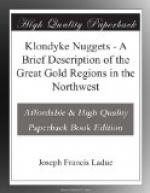“The number of persons engaged in mining in the locality mentioned has steadily increased year by year since the date of Mr. Ogilvie’s survey, and it is estimated that at the commencement of the past season not less than one thousand men were so employed. Incident to this mineral development there must follow a corresponding growth in the volume of business of all descriptions, particularly the importation of dutiable goods, and the occupation of tracts of the public lands for mining purposes which according to the mining regulations are subject to the payment of certain prescribed dues and charges. The Alaska Commercial Company, for many years subsequent to the retirement of the Hudson’s Bay Company, had a practical monopoly of the trade of the Yukon, carrying into the country and delivering at various points along the river, without regard to the international boundary line or the customs laws and regulations of Canada, such articles of commerce as were required for the prosecution of the fur trade and latterly of placer mining, these being the only two existing industries. With the discovery of gold, however, came the organization of a competing company known as the North American Transportation and Trading Company, having its headquarters in Chicago and its chief trading and distributing post at Cudahy. This company has been engaged in this trade for over three years, and during the past season despatched two ocean steamers from San Francisco to St. Michael, at the mouth of the Yukon, the merchandise from which was, at the last mentioned point, transhipped into river steamers and carried to points inland, but chiefly to the company’s distributing centre within Canadian territory. Importations of considerable value, consisting of the immediately requisite supplies of the miners, and their tools, also reach the Canadian portion of the Yukon District from Juneau, in the United States, by way of the Taiya Inlet, the mountain passes, and the chain of waterways leading therefrom to Cudahy. Upon none of these importations had any duty been collected, except a sum of $3,248.80 paid to Inspector Constantine in 1894, by the North American Transportation and Trading Company and others, and it is safe to conclude, especially when it is remembered that the country produces none of the articles consumed within it except fresh meat, that a large revenue was being lost to the public exchequer under the then existing conditions.
“For the purpose of ascertaining officially and authoritatively the condition of affairs to which the correspondence referred to in the next preceding paragraph relates, the Honorable the President of the Privy Council, during the spring of 1894, despatched Inspector Charles Constantine, of the Northwest Mounted Police Force, accompanied by Sergeant Brown, to Fort Cudahy and the mining camps in its vicinity. The report made by Mr. Constantine on his return, established the substantial accuracy of the representations already referred to. The value of the total output of gold for the season of 1894 he estimated at $300,000.




